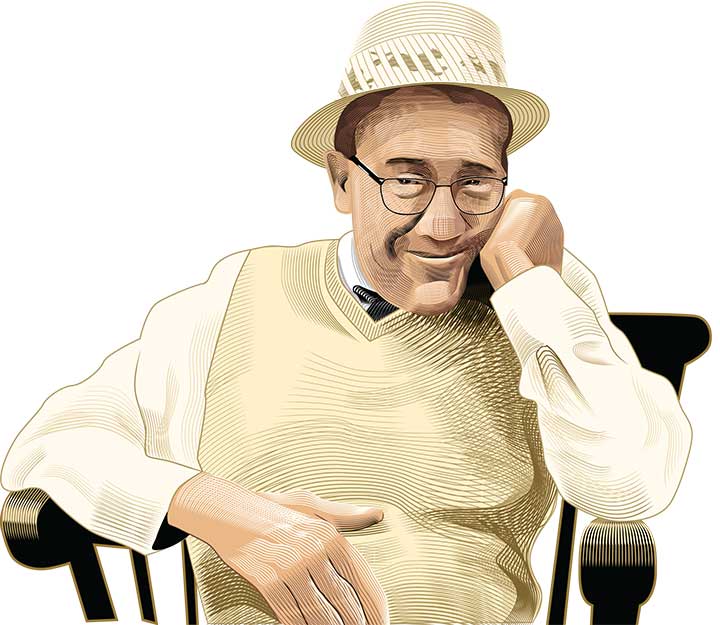When Frederic Fox ’39 worked at the White House during the Eisenhower administration, he liked to pretend he was giving Orange Key tours, showing acquaintances historical features of the building while using stylistic devices from campus, like adding numerals to names: “This is the Red Room with Woodrow Wilson ’[18]79 over the fireplace. This is the East Room, and there’s the portrait of Washington which Dolley Madison ’71 [Fox gave her the numerals of her husband, James] saved from the fire.” He was in the Olympus of the modern world, but his heart yearned to be in Princeton.
He got his wish, returning to campus and becoming a Princeton legend himself: custodian of school spirit, archivist of arcana, and occupant of an office in Nassau Hall that resembled an old curiosity shop, stuffed with Princeton rarities and a huge collection of tigers. He carried a squirt gun, wore a boater hat, and rode a jalopy bicycle with a tiger tail waggling behind.
“He was one of the beloved and outstanding characters of Princeton,” says John V. Fleming *63, a professor emeritus of English. “If there was one guy about whom you’d say, ‘That’s Mr. Princeton,’ that’s Freddie Fox.”
As an undergraduate, Fox wrote the On the Campus column for PAW and trod the boards for the Triangle Club. After Pearl Harbor cut short a budding career in Hollywood, he joined the Army Signal Corps — serving, until June 1945, in the Ghost Army, a “deception unit” that disguised the movements of real units by impersonating their members. For example, Fox might impersonate a general from an Allied unit that had already left a city, riding around in a jeep and visiting cafés with the aim of fooling enemy informants. “If he hadn’t done the Triangle Show at Princeton, he wouldn’t have been the actor he was in the Army,” says his son, Donald Fox.
With the help of workmen, he snuck a 1939 nickel into the gold ball beneath the weather vane atop Nassau Hall.
After the war, Fred Fox worked for the ministry in Ohio and in the White House as a liaison to church and volunteer organizations. In 1961 he left to teach in what was then Rhodesia; three years later, he returned to Princeton as recording secretary, a position he would hold for the rest of his life. He was part of the public face of the University, writing letters to alumni and donors and teaching “Old Nassau” to new students. With the help of workmen, he snuck a 1939 nickel into the gold ball beneath the weather vane atop Nassau Hall.
In 1976, he received the official title “Keeper of Princetoniana,” the only person to hold the post. He said at the time, “Although the title sounds like I’m becoming an antiquarian — stuck up in the attic with a lot of dusty things — I hope to continue working with things that are very much alive: orange and black things, both material and human, including primarily the people who give such a special spirit to this old place.”
Fox used his reputation as “Mr. Princeton” to nudge alumni in the direction of progress. In 1968, when the alumni held a nonbinding vote on whether the University should admit women, Fox was a great force in support of coeducation. When undergraduate women first arrived on campus in September 1969, Fox gave each one, at registration, a long-stemmed chrysanthemum, 179 in total. “In previous years,” he explained, “when women came to campus as guests, we would give them flowers. ... So we wanted to do the same for these young women.”
Before his death, Fox asked the Princeton University Band to play at his memorial service; the band still honors him with an annual Fred Fox Memorial Concert at Reunions. At Fox’s memorial service, University President William G. Bowen *58 read a fable that Fox wrote for the occasion. It began: “Once upon a time, there was a little boy who came to Princeton and lived happily ever after.”












1 Response
Arthur Diaz ’82
6 Years AgoA Fred Fox Tale
Your July 10 Princeton Portrait of Fred Fox ’39 evoked one of my favorite early memories of Princeton, from freshman orientation week in September 1978. The Class of 1982 was gathered together as a group in Alexander Hall for maybe the first time ever as Freddy introduced us to Princetoniana, ranging from some of the school’s history to the proper way to sing “Old Nassau.”
Early in his remarks, he sought to allay our nervousness about entering such an elite institution. “I’m sure many of you have concerns about how well you’ll be able to handle the workload at Princeton,” he said, “but there’s no need to worry. Look at the person seated to the right of you.” We all dutifully turned to the right. “Now look at the person on your left.” We turned left. “You’re smarter than both of them!”